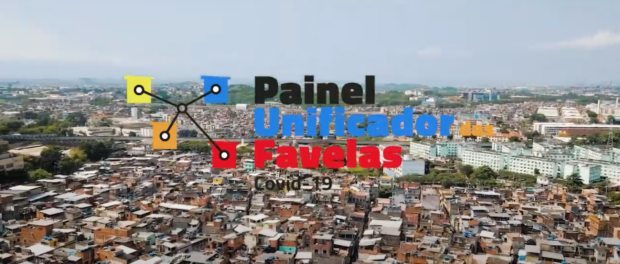Covid-19 in Favelas Unified Dashboard Launches Campaign Showing How Data Saves Lives
Action is part of the Covid-19 in Favelas Unified Dashboard’s campaign to overcome Rio’s pandemic data deficit.
 On October 26, Catalytic Communities’ Covid-19 in Favelas Unified Dashboard (www.favela.info) launched a video (video.favela.info) and campaign on social media to raise awareness about the importance of access to data about the pandemic in favelas and inviting the public to declare their own Covid-19 cases.
On October 26, Catalytic Communities’ Covid-19 in Favelas Unified Dashboard (www.favela.info) launched a video (video.favela.info) and campaign on social media to raise awareness about the importance of access to data about the pandemic in favelas and inviting the public to declare their own Covid-19 cases.
The Dashboard is the most consistent data source on the reach of the pandemic into Rio de Janeiro’s favelas, maintained by a network of 20 community collectives, organizations, and initiatives engaged in the prevention and documentation of the pandemic across the city. It was launched in July in response to the underreporting of Covid-19 data in favelas of the Rio de Janeiro Metropolitan Region and today covers 185 favelas, a number that grows each week with the identification of new data sources.
The Covid-19 in Favelas Unified Dashboard collects data through the perspective of those who are inside the communities and values the power of engagement and work of favela collectives and residents. The campaign video was produced by the Jacarezinho Audiovisual Lab, LabJaca, one of the favela-based collectives involved in the project.
In the video, four members explain the importance of citizen data collection and explain in an accessible fashion why it is important to develop a community response to the underreporting of Covid-19 in favelas:
Tatiana Lima, a popular reporter, representing Catalytic Communities (CatComm),* explains that “since March, Brazil is experiencing not only a pandemic, but a pandemic within the pandemic. In a country as unequal as Brazil, Covid-19 produces more inequalities within the inequalities that already exist… So, starting with social class, color, race and gender, people are experiencing their own pandemics.”
Douglas Heliodoro of the Rio das Pedras favela’s Peripheral Connection group, explains that “the lack of effective government action, principally from the federal government, has greatly impacted the poorest population that must work, that needs to survive. The number of deaths in the favelas has to do with this social inequality and with this selective presence of the State, which is only present, unfortunately, in the form of police.”
Renata Gracie of the communications department of Brazil’s national health foundation, Fiocruz, describes how “the Covid-19 in Favelas Unified Dashboard started as a need raised in CatComm meetings [with favela-based communicators and leaders] because a lot of people were pointing out the countless deaths in the favelas. Visibility was low for this information. For civil society to be able to pressure public authorities, we need to have information, and the more precise this information, the better for decision-making.”
Since July, each week, the Unified Dashboard has sought new sources of data, favela by favela, whether public data or from local rapporteurs. Bia Carvalho, the founder of the Women in Front collective in São João de Meriti, describes that “starting from the moment that I have the opportunity to enter the home of a relative living in a favela and to… ask them to fill in data, things are better. The Internet doesn’t reach inside the favela and when it does, it’s precarious. So this project is carried out by many arms working together.”
The video was filmed in Jacarezinho, next to Fiocruz, in Rio de Janeiro’s North Zone, taking all of the required health precautions. In the video, the Dashboard members show how checking data about the epidemic through their own groups in the favelas helps overcome the crucial information deficit about Covid-19. Another purpose of the campaign and the video is to invite more residents to participate in the initiative, as they are able to fill out a self-evaluation of any symptoms and notify cases through the Dashboard.
Using the hashtags #DataSavesLives [#DadosSalvamVidas], #DataIsPower [#DadosSãoPoder], #Covid19InTheFavelas [#Covid19NasFavelas] and #FavelasUnifiedDashboard [#PainelUnificadorDasFavelas], the campaign aims to raise awareness about the importance of the production and use of data to inform and construct public policy to tackle the pandemic in favelas and other parts of the city.
The latest report from the Covid-19 in Favelas Unified Dashboard (October 26), which accompanies 72 favelas and complexes of favelas in the Rio de Janeiro Metropolitan Region (185 individual favelas), counted 18,138 cases and 2,243 deaths among favela residents.
How to collaborate?
- Share the video with hashtags: #DataSavesLives [#DadosSalvamVidas], #DataIsPower [#DadosSãoPoder], #Covid19InTheFavelas [#Covid19NasFavelas] and #FavelasUnified Dashboard [#PainelUnificadorDasFavelas]
- Visit www.favela.info and participate.
- Check your symptoms http://avaliarcovid.favela.info.
- Follow on Facebook fb.favela.info.
Watch the Campaign Video:
About the Covid-19 in Favelas Unified Dashboard
The Covid-19 in Favelas Unified Dashboard arose in the context of the Covid-19 pandemic, noticing that the lack of testing and underreporting of data about Covid-19 in favelas is among the reasons for the high fatality rate in those territories.
We are a network of 20 collectives and organizations in the Rio de Janeiro Metropolitan Region dedicated to citizen science, collecting data to guarantee adequate public policies. We will continue, beyond Covid-19, to act in this space.
Delivery and management: Comunidades Catalisadoras (ComCat). Partners and producers: A.M.I.G.A.S. | Centro Social Fusão | Coletivo Conexões Periféricas-RP | Covid por CEP | Data_Labe | Fala Roça | Favela Vertical | Fiocruz | Fórum Grita Baixada | Frente de Mobilização da Maré | Instituto Educacional Araujo Dutra | LabJaca | Mulheres de Frente | Observatório de Favelas | PerifaConnection | Redes da Maré | SOS Providência | TETO | Voz das Comunidades | WikiFavelas
Contact: covid19nasfavelas@comcat.org





